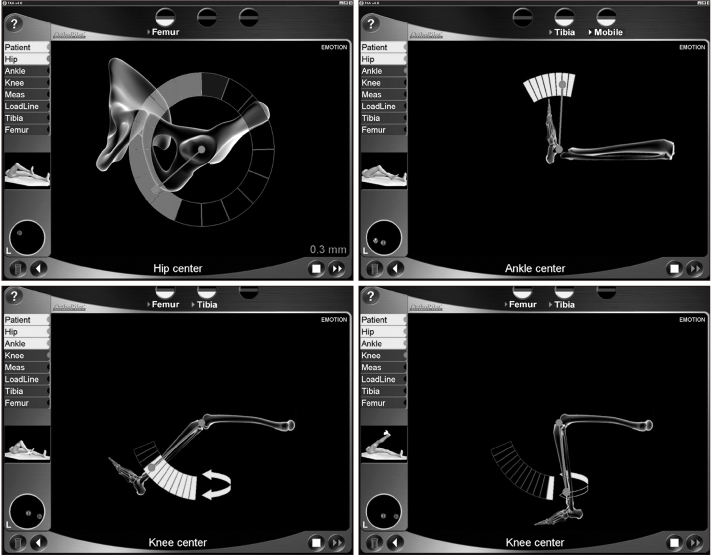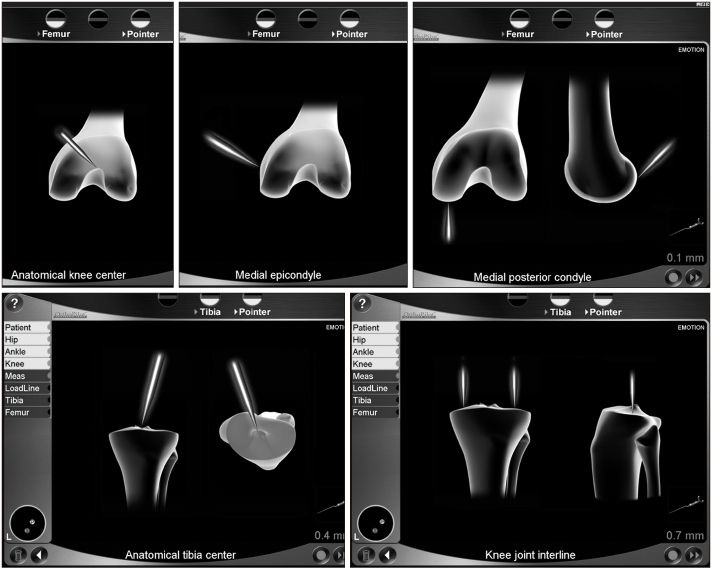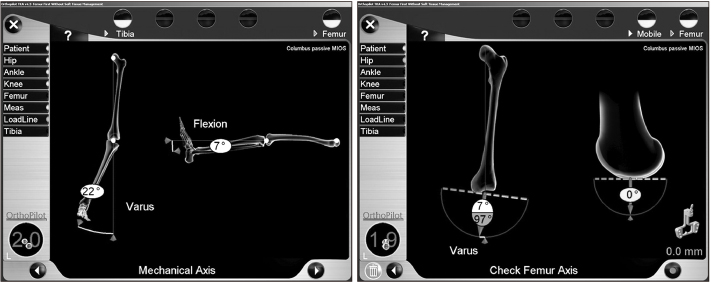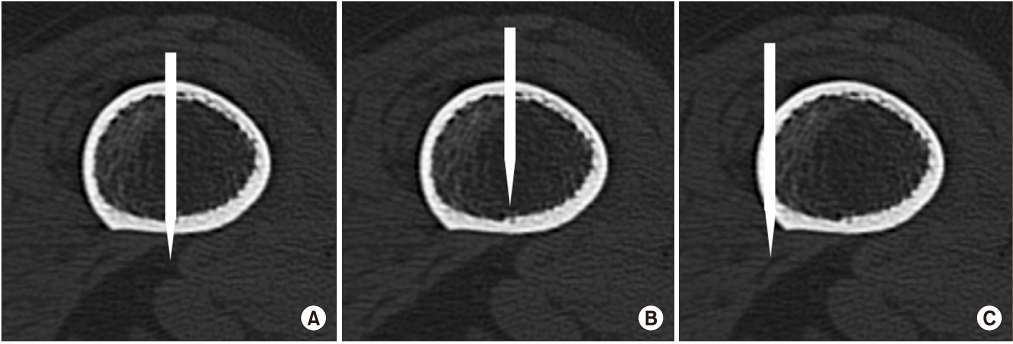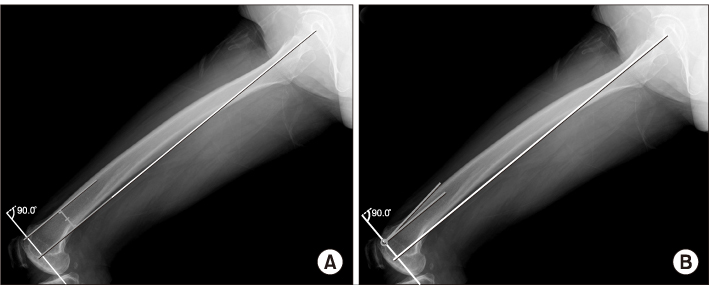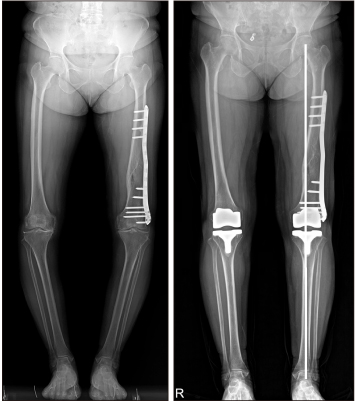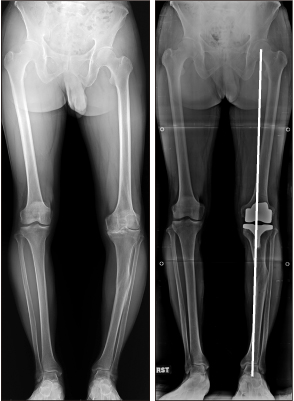J Korean Orthop Assoc.
2018 Dec;53(6):478-489. 10.4055/jkoa.2018.53.6.478.
Computer-Assisted Navigation in Total Knee Arthroplasty
- Affiliations
-
- 1Department of Orthopaedic Surgery, Kangbuk Samsung Hospital, Sungkyunkwan University School of Medicine, Seoul, Korea.
- 2Department of Orthopedic Surgery, Chung-Ang University Hospital, Chung-Ang University College of Medicine, Seoul, Korea. gustinolhj@nate.com
- KMID: 2430054
- DOI: http://doi.org/10.4055/jkoa.2018.53.6.478
Abstract
- Total knee arthroplasty has become a standard procedure for advanced knee arthritis to relieve pain and improve function. Computer-assisted navigation systems have been used in total knee arthroplasty to improve the mechanical axis of the limb as well as the alignment and position of the components. A computer-assisted navigation system has the advantage of real-time feedback during surgery, such as mediolateral balance in extension and flexion gap, alignment of the lower limb, and components. On the other hand, the computer-assisted navigation system requires an additional stab wound for tracker fixation, which can increase the likelihood of superficial wound infection and stress fractures and increase the operation time and cost of surgery. The clinical efficacy of computer-assisted navigation in total knee arthroplasty is also controversial. Compared to the conventional technique, computer navigation improves the accuracy of the postoperative mechanical axis within outliers of 3° varus or 3° valgus. This paper reviews the surgical technique, pitfalls, clinical and radiological outcomes, useful clinical cases, and future perspectives in computer-assisted navigation total knee arthroplasty.
Keyword
MeSH Terms
Figure
Reference
-
1. Robertsson O, Dunbar M, Pehrsson T, Knutson K, Lidgren L. Patient satisfaction after knee arthroplasty: a report on 27,372 knees operated on between 1981 and 1995 in Sweden. Acta Orthop Scand. 2000; 71:262–267.
Article2. Ritter MA, Faris PM, Keating EM, Meding JB. Postoperative alignment of total knee replacement. Its effect on survival. Clin Orthop Relat Res. 1994; (299):153–156.
Article3. Sharkey PF, Hozack WJ, Rothman RH, Shastri S, Jacoby SM. Insall award paper. Why are total knee arthroplasties failing today? Clin Orthop Relat Res. 2002; (404):7–13.4. Barrack RL, Schrader T, Bertot AJ, Wolfe MW, Myers L. Component rotation and anterior knee pain after total knee arthroplasty. Clin Orthop Relat Res. 2001; (392):46–55.
Article5. Bonutti PM, Dethmers D, Ulrich SD, Seyler TM, Mont MA. Computer navigation-assisted versus minimally invasive TKA: benefits and drawbacks. Clin Orthop Relat Res. 2008; 466:2756–2762.6. Ensini A, Catani F, Leardini A, Romagnoli M, Giannini S. Alignments and clinical results in conventional and navigated total knee arthroplasty. Clin Orthop Relat Res. 2007; 457:156–162.
Article7. Mahaluxmivala J, Bankes MJ, Nicolai P, Aldam CH, Allen PW. The effect of surgeon experience on component positioning in 673 Press Fit Condylar posterior cruciate-sacrificing total knee arthroplasties. J Arthroplasty. 2001; 16:635–640.
Article8. Mihalko WM, Boyle J, Clark LD, Krackow KA. The variability of intramedullary alignment of the femoral component during total knee arthroplasty. J Arthroplasty. 2005; 20:25–28.
Article9. Stulberg SD, Yaffe MA, Koo SS. Computer-assisted surgery versus manual total knee arthroplasty: a case-controlled study. J Bone Joint Surg Am. 2006; 88:Suppl 4. 47–54.
Article10. Browne JA, Cook C, Hofmann AA, Bolognesi MP. Postoperative morbidity and mortality following total knee arthroplasty with computer navigation. Knee. 2010; 17:152–156.
Article11. Hinarejos P, Corrales M, Matamalas A, Bisbe E, Cáceres E. Computer-assisted surgery can reduce blood loss after total knee arthroplasty. Knee Surg Sports Traumatol Arthrosc. 2009; 17:356–360.
Article12. Burnett RS, Barrack RL. Computer-assisted total knee arthroplasty is currently of no proven clinical benefit: a systematic review. Clin Orthop Relat Res. 2013; 471:264–276.
Article13. Rebal BA, Babatunde OM, Lee JH, Geller JA, Patrick DA Jr, Macaulay W. Imageless computer navigation in total knee arthroplasty provides superior short term functional outcomes: a meta-analysis. J Arthroplasty. 2014; 29:938–944.
Article14. Weng YJ, Hsu RW, Hsu WH. Comparison of computer-assisted navigation and conventional instrumentation for bilateral total knee arthroplasty. J Arthroplasty. 2009; 24:668–673.
Article15. Choi WC, Lee S, An JH, Kim D, Seong SC, Lee MC. Plain radiograph fails to reflect the alignment and advantages of navigation in total knee arthroplasty. J Arthroplasty. 2011; 26:756–764.
Article16. Kim SH, Lim JW, Jung HJ, Lee HJ. Influence of soft tissue balancing and distal femoral resection on flexion contracture in navigated total knee arthroplasty. Knee Surg Sports Traumatol Arthrosc. 2017; 25:3501–3507.
Article17. van der, Chawla H, Joskowicz L, Pearle AD. Current state of computer navigation and robotics in unicompartmental and total knee arthroplasty: a systematic review with meta-analysis. Knee Surg Sports Traumatol Arthrosc. 2016; 24:3482–3495.
Article18. Daines BK, Dennis DA. Gap balancing vs. measured resection technique in total knee arthroplasty. Clin Orthop Surg. 2014; 6:1–8.
Article19. Lustig S, Fleury C, Servien E, Demey G, Neyret P, Donell ST. The effect of pelvic movement on the accuracy of hip centre location acquired using an imageless navigation system. Int Orthop. 2011; 35:1605–1610.
Article20. Jenny JY, Boeri C. Low reproducibility of the intra-operative measurement of the transepicondylar axis during total knee replacement. Acta Orthop Scand. 2004; 75:74–77.
Article21. Stulberg SD, Loan P, Sarin V. Computer-assisted navigation in total knee replacement: results of an initial experience in thirty-five patients. J Bone Joint Surg Am. 2002; 84-A:Suppl 2. 90–98.22. Jung HJ, Jung YB, Song KS, Park SJ, Lee JS. Fractures associated with computer-navigated total knee arthroplasty. A report of two cases. J Bone Joint Surg Am. 2007; 89:2280–2284.23. Collier MB, Engh CA Jr, McAuley JP, Ginn SD, Engh GA. Osteolysis after total knee arthroplasty: influence of tibial baseplate surface finish and sterilization of polyethylene insert. Findings at five to ten years postoperatively. J Bone Joint Surg Am. 2005; 87:2702–2708.24. Matsumoto T, Tsumura N, Kurosaka M, et al. Prosthetic alignment and sizing in computer-assisted total knee arthroplasty. Int Orthop. 2004; 28:282–285.
Article25. Lasam MP, Lee KJ, Chang CB, Kang YG, Kim TK. Femoral lateral bowing and varus condylar orientation are prevalent and affect axial alignment of TKA in Koreans. Clin Orthop Relat Res. 2013; 471:1472–1483.
Article26. Bargren JH, Blaha JD, Freeman MA. Alignment in total knee arthroplasty. Correlated biomechanical and clinical observations. Clin Orthop Relat Res. 1983; (173):178–183.27. Cheng T, Zhao S, Peng X, Zhang X. Does computer-assisted surgery improve postoperative leg alignment and implant positioning following total knee arthroplasty? A meta-analysis of randomized controlled trials? Knee Surg Sports Traumatol Arthrosc. 2012; 20:1307–1322.
Article28. Cip J, Widemschek M, Luegmair M, Sheinkop MB, Benesch T, Martin A. Conventional versus computer-assisted technique for total knee arthroplasty: a minimum of 5-year follow-up of 200 patients in a prospective randomized comparative trial. J Arthroplasty. 2014; 29:1795–1802.
Article29. Kim YH, Park JW, Kim JS. Computer-navigated versus conventional total knee arthroplasty a prospective randomized trial. J Bone Joint Surg Am. 2012; 94:2017–2024.30. Kim YH, Park JW, Kim JS. The clinical outcome of computer-navigated compared with conventional knee arthroplasty in the same patients: a prospective, randomized, double-blind, long-term study. J Bone Joint Surg Am. 2017; 99:989–996.31. Kinney MC, Cidambi KR, Severns DL, Gonzales FB. Comparison of the iAssist handheld guidance system to conventional instruments for mechanical axis restoration in total knee arthroplasty. J Arthroplasty. 2018; 33:61–66.
Article32. Singla A, Malhotra R, Kumar V, Lekha C, Karthikeyan G, Malik V. A randomized controlled study to compare the total and hidden blood loss in computer-assisted surgery and conventional surgical technique of total knee replacement. Clin Orthop Surg. 2015; 7:211–216.
Article33. Song EK, Agrawal PR, Kim SK, Seo HY, Seon JK. A randomized controlled clinical and radiological trial about outcomes of navigation-assisted TKA compared to conventional TKA: long-term follow-up. Knee Surg Sports Traumatol Arthrosc. 2016; 24:3381–3386.
Article34. Todesca A, Garro L, Penna M, Bejui-Hugues J. Conventional versus computer-navigated TKA: a prospective randomized study. Knee Surg Sports Traumatol Arthrosc. 2017; 25:1778–1783.
Article35. Zhang Z, Gu B, Zhu W, Zhu L, Li Q, Du Y. Minimally invasive and computer-assisted total knee arthroplasty versus conventional technique: a prospective, randomized study. Eur J Orthop Surg Traumatol. 2014; 24:1475–1479.
Article36. Zhu M, Ang CL, Yeo SJ, Lo NN, Chia SL, Chong HC. Minimally invasive computer-assisted total knee arthroplasty compared with conventional total knee arthroplasty: a prospective 9-year follow-up. J Arthroplasty. 2016; 31:1000–1004.
Article37. Kobayashi H, Akamatsu Y, Kumagai K, Kusayama Y, Aratake M, Saito T. Influence of coronal bowing on the lower alignment and the positioning of component in navigation and conventional total knee arthroplasty. Orthop Traumatol Surg Res. 2017; 103:251–256.
Article38. McClelland JA, Webster KE, Ramteke AA, Feller JA. Total knee arthroplasty with computer-assisted navigation more closely replicates normal knee biomechanics than conventional surgery. Knee. 2017; 24:651–656.
Article39. Shah NA, Patil HG, Dhawale AS, Khedkar BM. Limited femoral navigation versus conventional intramedullary femoral jig based instrumentation for achieving optimal restoration of mechanical axis post total knee arthroplasty: a prospective comparative study of 200 knees. J Arthroplasty. 2015; 30:559–563.
Article40. Ajwani SH, Jones M, Jarratt JW, Shepard GJ, Ryan WG. Computer assisted versus conventional total knee replacement: a comparison of tourniquet time, blood loss and length of stay. Knee. 2012; 19:606–610.
Article41. Bae DK, Song SJ, Park CH, Ko YW, Lee H. A comparison of the medium-term results of total knee arthroplasty using computer-assisted and conventional techniques to treat patients with extraarticular femoral deformities. J Arthroplasty. 2017; 32:71–78.
Article42. Baier C, Wolfsteiner J, Otto F, et al. Clinical, radiological and survivorship results after ten years comparing navigated and conventional total knee arthroplasty: a matched-pair analysis. Int Orthop. 2017; 41:2037–2044.43. Baumbach JA, Willburger R, Haaker R, Dittrich M, Kohler S. 10-year survival of navigated versus conventional TKAs: a retrospective study. Orthopedics. 2016; 39:S72–S76.
Article44. Liodakis E, Antoniou J, Zukor DJ, Huk OL, Epure LM, Bergeron SG. Navigated vs conventional total knee arthroplasty: is there a difference in the rate of respiratory complications and transfusions? J Arthroplasty. 2016; 31:2273–2277.
Article45. Hetaimish BM, Khan MM, Simunovic N, Al-Harbi HH, Bhandari M, Zalzal PK. Meta-analysis of navigation vs conventional total knee arthroplasty. J Arthroplasty. 2012; 27:1177–1182.
Article46. Moskal JT, Capps SG, Mann JW, Scanelli JA. Navigated versus conventional total knee arthroplasty. J Knee Surg. 2014; 27:235–248.
Article47. Kim KK, Heo YM, Won YY, Lee WS. Navigation-assisted total knee arthroplasty for the knee retaining femoral intramedullary nail, and distal femoral plate and screws. Clin Orthop Surg. 2011; 3:77–80.
Article48. Klein GR, Austin MS, Smith EB, Hozack WJ. Total knee arthroplasty using computer-assisted navigation in patients with deformities of the femur and tibia. J Arthroplasty. 2006; 21:284–288.
Article49. Bottros J, Klika AK, Lee HH, Polousky J, Barsoum WK. The use of navigation in total knee arthroplasty for patients with extra-articular deformity. J Arthroplasty. 2008; 23:74–78.
Article50. Hernández-Vaquero D, Suarez-Vazquez A, Sandoval-Garcia MA, Noriega-Fernandez A. Computer assistance increases precision of component placement in total knee arthroplasty with articular deformity. Clin Orthop Relat Res. 2010; 468:1237–1241.
Article51. Nam D, Cody EA, Nguyen JT, Figgie MP, Mayman DJ. Extramedullary guides versus portable, accelerometer-based navigation for tibial alignment in total knee arthroplasty: a randomized, controlled trial: winner of the 2013 HAP PAUL award. J Arthroplasty. 2014; 29:288–294.
Article52. Nam D, Cross M, Deshmane P, Jerabek S, Kang M, Mayman DJ. Radiographic results of an accelerometer-based, handheld surgical navigation system for the tibial resection in total knee arthroplasty. Orthopedics. 2011; 34:e615–e621.
Article53. Nam D, Park A, Stambough JB, Johnson SR, Nunley RM, Barrack RL. The Mark coventry award: custom cutting guides do not improve total knee arthroplasty clinical outcomes at 2 years followup. Clin Orthop Relat Res. 2016; 474:40–46.
Article54. Pfitzner T, Abdel MP, von Roth P, Perka C, Hommel H. Small improvements in mechanical axis alignment achieved with MRI versus CT-based patient-specific instruments in TKA: a randomized clinical trial. Clin Orthop Relat Res. 2014; 472:2913–2922.
Article
- Full Text Links
- Actions
-
Cited
- CITED
-
- Close
- Share
- Similar articles
-
- Computer Assisted Navigation in Knee Arthroplasty
- Total Knee Arthroplasty Using Computer-Assisted Navigation in Patient with Ipsilateral Hemiarthroplasty and Angle Blade Plate Fixation: A Case Report
- Navigation-Assisted Knee Arthroplasty in Case of Extra-Articular Deformity or Retained Hardware
- Navigation-Assisted Total Knee Arthroplasty for the Knee Retaining Femoral Intramedullary Nail, and Distal Femoral Plate and Screws
- Computer-Assisted Total Hip Arthroplasty

